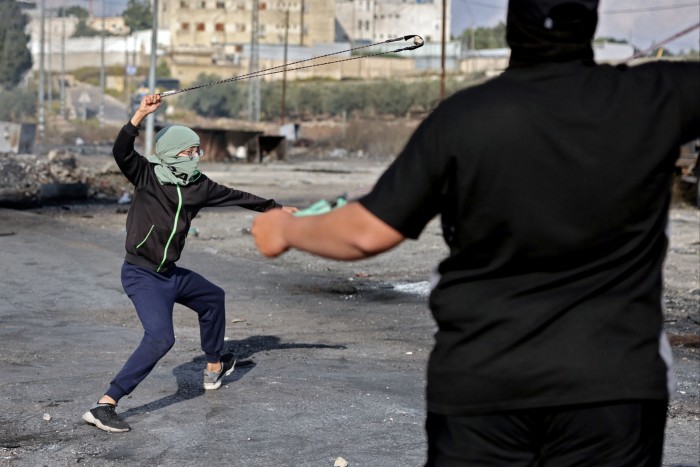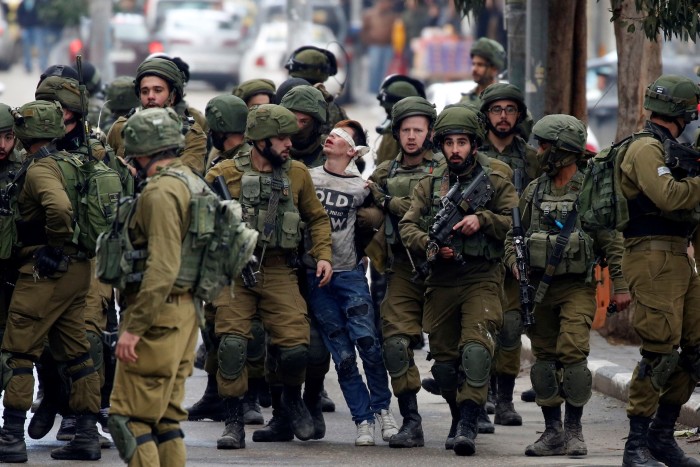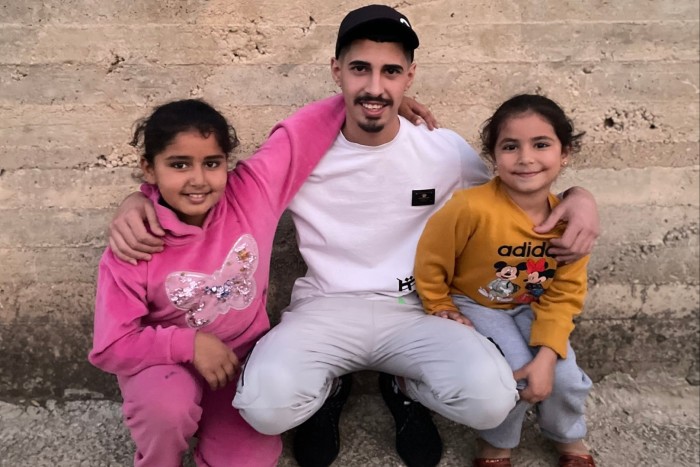For the past six days, Israel has let 30 Palestinian women and children out of jail for every 10 hostages Hamas has released from captivity in Gaza.
To Israel, each is a terrorist, convicted in a military court of crimes from attempted murder to the vaguely worded “damage to security area”.
And then there are the stone throwers. It is the most common offence for which the Israeli military jails Palestinian children, and a rite of passage for many teenagers confronted with the constant presence of Israeli soldiers in their villages in the occupied West Bank.
From being taken from their beds at night by armed soldiers to their eventual convictions, the teenagers undergo a well-documented journey punctuated with beatings, harassment, separation from their families and eventually months in Israeli prisons, according to Israeli and foreign human rights groups.
Israel was holding about 146 Palestinian minors for “security offences” — the youngest was 14 — in its prisons as of September, according to government data. It has arrested many more, the final tally is unknown, since October 7 when Israel declared war on Hamas after a cross-border raid in which 1,200 people were killed.
Minors are held separately from adults, but human rights groups and those released during the truce said that conditions in jail sharply deteriorated after October 7. More teenagers were crowded into each cell, less food was given and family visits were cut off, they said.
One girl told Al Jazeera that she was tear-gassed repeatedly. Three boys told the Financial Times that they were beaten, were pepper-sprayed and slapped during transportation, and one said he was threatened with a gun while being interrogated.
The Israeli military referred all queries on the issue to the Ministry of Justice, which, in turn, referred the FT to the Shin Bet security agency, which did not reply to a detailed list of questions.
As Palestinians arrested in occupied territory, the teenagers are sent to military courts, unlike Israeli settlers who enjoy the greater protections of civilian courts. Human rights groups such as Israel’s B’Tselem and Human Rights Watch point to this discrepancy as support for their charge of “apartheid” in the West Bank, an accusation that Israel rejects.
Evidence in military courts, including against minors, is often presented in secret, and parts of it are withheld from their lawyers. Almost all plead guilty to avoid long, complex and expensive trials, contributing to a conviction rate above 90 per cent.




In the little village of Beit Ur al-Tahta, Laith Othman, 16, with the tiniest wisp of a moustache, sits beside his father, confused by his ascension from local pizza delivery boy to one of the bargaining chips in a hostage-and-prisoner swap that has gripped Israelis and Palestinians.
At least a dozen Israeli soldiers broke into Laith’s family home in April during Ramadan, said his parents. Night-time raids account for the vast majority of arrests of Palestinian minors in the West Bank, according to the Center for the Defence of the Individual, or HaMoKed by its Hebrew abbreviation, an Israeli rights group.
“Palestinian minors are detained in these very traumatic night-time arrests. Instead of giving a summons, a huge group of soldiers shows up in the middle of the night and drags teenage boys from their beds,” said Jessica Montell, executive director of HaMoKed.
Groups such as HaMoKed have documented many similar accounts of harsh treatment, although individual accounts often cannot be independently verified. They do not include claims of systematic torture.
Laith woke up to a gun in his face, and his parents were not told where he was being taken. They said he was not allowed to put on trousers, was blindfolded, his hands tied with plastic cuffs, and placed into an army jeep with his older brother, who was released in September.
“I hope no one has to live through this — the fear, the hopelessness, the anger you feel, when you don’t know what they are going to do to your son,” said his mother, Wala, 36. “The Israelis see us as terrorists when one of us throws a stone.”




While Laith was in detention, his father Khalil, 41, would sit outside the military tribunal in Ofer Prison, in the West Bank, hoping to catch a glimpse of his son as he was brought to court and pass him food.
Khalil worried that Laith would confess under duress to “something he hadn’t done”. “You would sit there in the sun, in the cold, in front of the prison, all day, all night, you would just sit there and wait,” he said.
Laith was eventually sentenced to nine months for stone-throwing, his father said. The IDF did not reply to a query on his exact charges.
“There’s not one family in Palestine that this hasn’t happened to,” said Khalil, who was also imprisoned when young for throwing stones. “I am living under occupation, all I can do is throw stones.”
After October 7, the prison rations were cut to a small cup of yoghurt, some rice and hot dogs for each day. “Never enough for all of us,” said Laith.
TVs and radios were cut off to stop the teenagers from knowing that there were negotiations for them to be released, or even that there was a war at all, he said. They only heard news of the outside world when a new prisoner was brought in.
Laith was released on Saturday as part of an exchange of Hamas-held hostages for Palestinian prisoners. He emerged into a celebration of Palestinian families, with crowds gathering around Ofer Prison, letting off firecrackers while Israeli police let off tear gas.
Their release, under the pressure of hostage negotiations, is an embarrassment to Itamar Ben-Gvir, the far-right minister for national security, who regularly refers to Palestinians as terrorists.
Ben-Gvir has ordered police to break up family celebrations in East Jerusalem, pulling down tents and snatching away the sweets and food that the families set out for their neighbours.
The release of Palestinian prisoners is also traumatic for some Israelis. Moriah Cohen, who was stabbed in East Jerusalem by a neighbour, told Kan radio that her assailant had returned to the same street.
“On the day that she returned, I literally shut the windows. For me, it was an act of denial,” she said. “She’s going to be wandering around among us and, more than that, my children know exactly what she did.”




Down the street from Laith’s house, Mohammed Darwish, who turned 16 in an Israeli prison, plays with his younger sisters while his mother recounts his arrest. Soldiers broke into their shack while Darwish was working at an internship in Ramallah. They forced the family to sit for hours, denied them water and threatened to demolish the home.
Darwish handed himself in the next day at a checkpoint. During interrogation, he said, one soldier put a gun to his face, telling him to confess and give up the names of his friends. “I said, if you want to shoot me, shoot me,” he said.
For 46 days, Darwish was held in the Moscovia Detention Centre in Jerusalem, where he was denied his asthma medication for weeks, his mother said.
“They used to hit me, swear at me, yell at me. They would give us a very thin blanket, and they would keep the room very cold with cockroaches all over it,” he said. He spent six days in solitary confinement and was eventually sentenced to eight months, his mother said, for throwing stones. An IDF document said his crime was “throwing a bomb”.
Ahead of sentencing he spent days being shuttled around Israel in a metal van with no seats, baking in the heat for hours in a system Palestinian prisoners call “the postal service”.
“You just keep dreaming about release,” he said. When he heard he was to be freed, “my insides felt like they took flight”, he said. “When I first got off the bus, and saw the sky without bars and screens, I became dizzy.”
Now, at home with his family after being released as part of the hostage-and-prisoner swap, he wonders what he will do and whether he can get a job or finish school.
“There’s always going to be someone who resists,” his mother said. “How else do we end the occupation?”
This post was originally published on this site be sure to check out more of their content.








